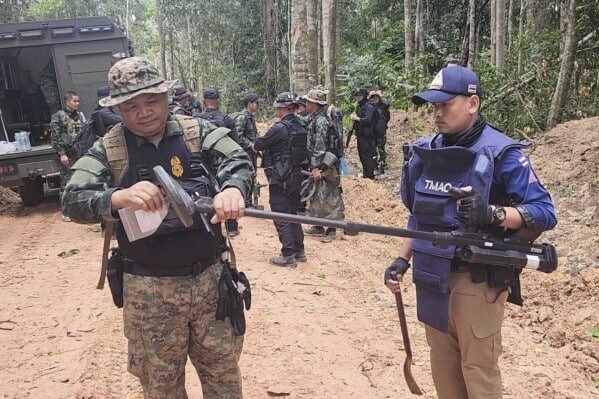Escalating Border Clashes Ignite Social Media Tensions Across Nations

As border clashes between Thailand and Cambodia escalate, resulting in over a dozen fatalities, both nations are grappling with rising tensions that extend beyond the battlefield. While governments strive to prevent further conflict, a fierce online war has erupted, fueled by nationalistic fervor. Citizens from both countries are engaging in heated exchanges on social media, debating issues of cultural pride and territorial claims, which have deep historical roots.
Escalating Online Hostilities
The recent border skirmishes have ignited a wave of aggressive discourse on social media platforms, where users from Thailand and Cambodia are trading insults and defending their respective governments’ narratives. The comment sections of posts related to the conflict have transformed into battlegrounds, with users passionately asserting their viewpoints. For instance, a Cambodian user on TikTok claimed, “Justice for Cambodia,” alleging that Thai troops initiated the violence. In response, a Thai user dismissed the claim, referring to Cambodia as a “scammer country” due to its reputation for scam operations. This back-and-forth has intensified, with hashtags like “CambodiaOpenedFire” and “ThailandOpenedFire” trending as each side attempts to rally support and assert their version of events.
The online discourse reflects a broader cultural rivalry that has simmered for decades, with both nations contesting ownership of historical sites and cultural practices. As the situation escalates, the potential for misinformation and hate speech on social media raises concerns about further division between the two populations.
Historical Context of Tensions
The roots of the conflict between Thailand and Cambodia can be traced back over a century, stemming from the delineation of borders during the French colonial era. A significant flashpoint occurred in 2008 when Cambodia registered the Preah Vihear temple, an 11th-century site near the disputed border, as a UNESCO World Heritage Site. This move sparked protests in Thailand, leading to increased military presence along the border and a deterioration of bilateral relations.
The rivalry extends beyond territorial disputes to encompass cultural elements such as cuisine, sports, and traditional attire. Thai nationalists often accuse Cambodians of cultural appropriation, while Cambodians retaliate with claims of cultural theft. Recent incidents, including a boycott by Thai kickboxers of the Southeast Asian Games held in Cambodia, highlight the ongoing tensions. As both nations vie for recognition of their cultural heritage, the stakes continue to rise, further complicating the relationship between the two countries.
Political Dynamics and Social Media Influence
The political landscape in both Thailand and Cambodia is also contributing to the escalating tensions. Recent comments from political figures on social media have added fuel to the fire. Thaksin Shinawatra, Thailand’s former prime minister, expressed a desire for military action against Cambodia, while Cambodian Prime Minister Hun Sen retaliated with sharp criticism of Thaksin’s character. This exchange reflects a fracturing relationship between the two leaders, exacerbated by a leaked phone call that embarrassed Thaksin’s daughter, leading to her suspension as prime minister.
As political leaders engage in social media battles, the potential for conflict to escalate remains a concern. The ongoing exchanges highlight how social media can amplify nationalist sentiments and contribute to a cycle of hostility. While both governments call for restraint, the online discourse suggests that the rivalry is far from over, with citizens on both sides continuing to engage in a digital war of words.
Concerns Over Misinformation and Violence
As tensions rise, there are growing concerns about the impact of misinformation on social media. Journalists’ associations in both countries have issued statements urging users to verify information before sharing, emphasizing the potential consequences of spreading unverified claims. The fear is that unchecked narratives could lead to increased animosity and even violence, as evidenced by a recent viral video showing a Thai man assaulting Cambodian workers.
Experts warn that the current climate of hostility could lead to real-world violence, particularly among groups that previously had no conflicts. The situation calls for careful navigation to prevent further escalation. As both nations grapple with their historical grievances and the influence of social media, the path forward remains uncertain, with the potential for both online and offline conflicts to continue.
Observer Voice is the one stop site for National, International news, Sports, Editor’s Choice, Art/culture contents, Quotes and much more. We also cover historical contents. Historical contents includes World History, Indian History, and what happened today. The website also covers Entertainment across the India and World.
Follow Us on Twitter, Instagram, Facebook, & LinkedIn

